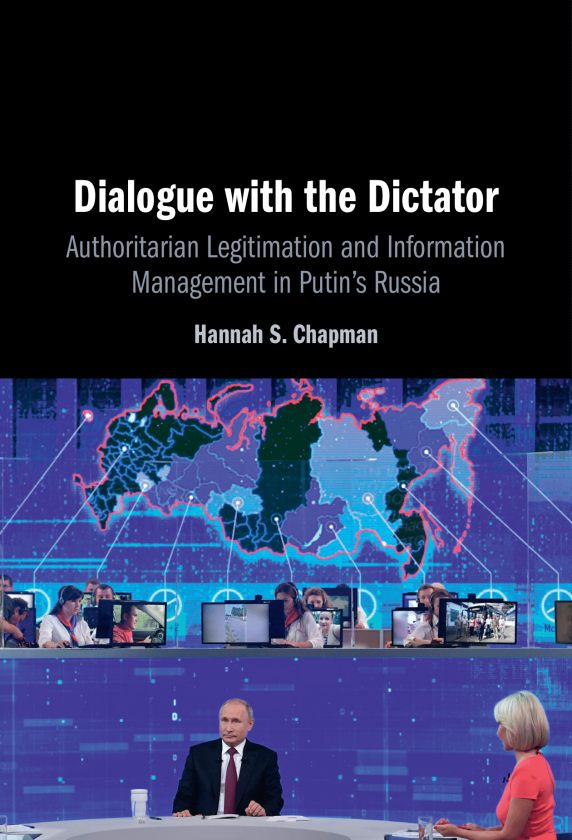Dialogue with the Dictator
(with Cambridge University Press)
Dialogue with the Dictator illuminates the ways in which authoritarian regimes structure interaction between citizens and leaders to simultaneously manage information dilemmas and build regime legitimacy. In doing so, it demonstrates the conditions under which managed participation can reinforce or jeopardize authoritarian control. Moreover, it uncovers how these tools are viewed from the perspective of the public and the mechanisms through which they influence attitudes toward the regime. Overall, Dialogue with the Dictators provides a novel theoretical framework for understanding managed participation under authoritarianism and explains both its benefits and potential consequences for regimes. By cultivating limited opportunities for participation in otherwise closed political systems, autocrats bolster regime legitimacy while still maintaining control of the means and content of communication. These tools ultimately reinforce and entrench autocratic leaders rather than contributing to increased prospects for democracy—but not without consequences.

Academic Articles and Book Chapters:
"Authoritarian Information Gathering Amid Crisis." (with Sasha deVogel and Lauren McCarthy). FirstView at Comparative Politics.
"Elite Narratives and State Response to Kazakhstan's Bloody January Protests." (with Raushan Zhandayeva). FirstView at Communist and Post-Communist Studies.
"Shocks to the System: Electoral Manipulation, Protests, and the Evolution of Political Trust in Russia." 2025. Government & Opposition 60 (2): 496–516.
- Recipient of Government & Opposition’s Elizabeth Meehan Best Article Prize for 2024
"Public opinion toward Russia’s war against Ukraine: Investigating wartime attitudes in Kazakhstan and Kyrgyzstan." 2025. (with Raushan Zhandayeva.) Post-Soviet Affiars 41 (1): 1-24.
"Leveraging Country Expertise: How Scholars in International Studies Can Support the Asylum Process." 2024. (with Rachel A. Schwartz). International Studies Perspectives 25 (4): 518–532.
"Under the veil of democracy: What do people mean when they say they support democracy?" 2024. (with Margaret Hanson, Valery Dzutsati, and Paul DeBell). Perspectives on Politics 22 (1): 97-115. DOI: 10.1017/S1537592722004157.
“Shoring Up Autocracy: Participatory Technologies and Regime Support in Putin's Russia." 2021. Comparative Political Studies 54 (8): 1459–1489. DOI: 10.1177/0010414021989759.
-
Best Conference Paper in Information Technology & Politics, American Political Science Association, 2017
-
Featured in The Academic Times
“Foreign Media Broadcasts as a Tool of Soft Power: Agenda Setting and Issue Framing Effects of Russian News in Kyrgyzstan.” With Theodore P. Gerber. International Studies Quarterly 63 (3): 756–769. DOI: 10.1093/isq/sqz046.
“Xenophobia on the Rise? Temporal and Regional Trends in Xenophobic Attitudes in Russia.” With Kyle L. Marquardt, Yoshiko M. Herrera, and Theodore P. Gerber. Comparative Politics 50 (3): 381-394. DOI: 10.5129/001041518822704944.
“To Know It is to Want More of It: The Intelligibility and Definition of Democracy, Support for Democratization, and Global City Residence in Russia.” With Theodore P. Gerber. 2017. Democratization 28 (3): 481-503. DOI: 10.1080/13510347.2017.1387537.
“Georgia.” 2017. In Online around the World: A Geographic Encyclopedia of the Internet, Social Media, and Mobile Apps. Editors, Marilyn Andrews and Laura Steckman. Santa Barbara: ABC–CLIO.
“Kyrgyzstan.” 2017. In Online around the World: A Geographic Encyclopedia of the Internet, Social Media, and Mobile Apps. Editors, Marilyn Andrews and Laura Steckman. Santa Barbara: ABC–CLIO.
Working Papers:
"Public Image Making in the Direct Line with Vladimir Putin." Under review.
"All Fraud is Not Created Equal: Perceptions of Electoral Malpractice and Electoral Integrity in Russia."
"What about Whataboutism: Strategic Narratives and Political Attitudes in Russia" (with Anton Shirikov).
"Performing Democracy: The Impact of Elite-Enabling and -Constraining Participatory Institutions on Vertical Accountability."
"Defining Democracy: The Origins of Democratic Conceptualization." (with Margaret Hanson, Valery Dzutsati, and Paul DeBell).
"The Ukraine Effect: Evolving Perceptions of Russia, China, and the West in Central Asia."
"Dimensions of Electronic Political Engagement: New Media, Old Media, and Public Opinion in Russia’s Contested Election Season of 2011-12." (with Theodore P. Gerber).
Other Publications:
“Attitudes toward Russia’s War on Ukraine in Kazakhstan and Kyrgyzstan.” (with Raushan Zhandayeva). 2023. PONARS Eurasia Policy Memo No. 867.
- Also published in The Impact of the Russo-Ukrainian War on the Broader Region, edited by Ellen Powell.
"What do people mean when they say they support democracy---and why should we care?" 2023. The Loop, ECPR's Political Science Blog.
"All Fraud Is Not Created Equal: Recent Electoral Manipulation Practices are Less Likely to Incite Public Ire." 2022. PONARS Eurasia Policy Memo No. 819.
"The Destruction of Academic Freedom and Social Science in Russia." (with Theodore P. Gerber). 2022. PONARS Eurasia Policy Memo No. 766.
-
Featured in Russia Matters.
“Thousands of Russians are protesting against the war with Ukraine. Putin’s not likely to listen.” 2022. The Monkey Cage [The Washington Post]. March 1
"Under the veil of democracy: What do people mean when they say they support democracy?" (with Margaret Hanson, Valery Dzutsati, and Paul DeBell). 2022. Center for the Study of Economic Liberty, Arizona State University. February 21.
“Democratic Decline, Authoritarian Resilience, and Individual Conceptualization: A Conversation with George F. Kennan Fellow Hannah Chapman.” 2021. Kennan Institute Scholar Spotlight The Woodrow Wilson International Center for Scholars. September 30.
“Putin would recognize Trump’s ‘reality TV’ techniques in the State of the Union address.” 2020. The Monkey Cage [The Washington Post]. February 11.
“Russian Propaganda Isn’t as Effective As You May Think.” (with Theodore P. Gerber). 2019. The Monkey Cage [The Washington Post]. September 5.
-
Featured on Johnson’s Public List and MSN.
“In Moscow, citizens have been protesting for five weekends in a row. What does the rest of Russia think?” 2019. The Monkey Cage [The Washington Post]. August 15.
“Putin now has his own TV show, following his daily life. This explains why.” 2018. The Monkey Cage [The Washington Post]. September 28.
“Russians are getting less xenophobic.” 2018. The Monkey Cage [The Washington Post]. April 18.
“Trump’s news conferences look a lot like Putin’s. Should you worry?” 2017. The Monkey Cage [The Washington Post]. February 18.